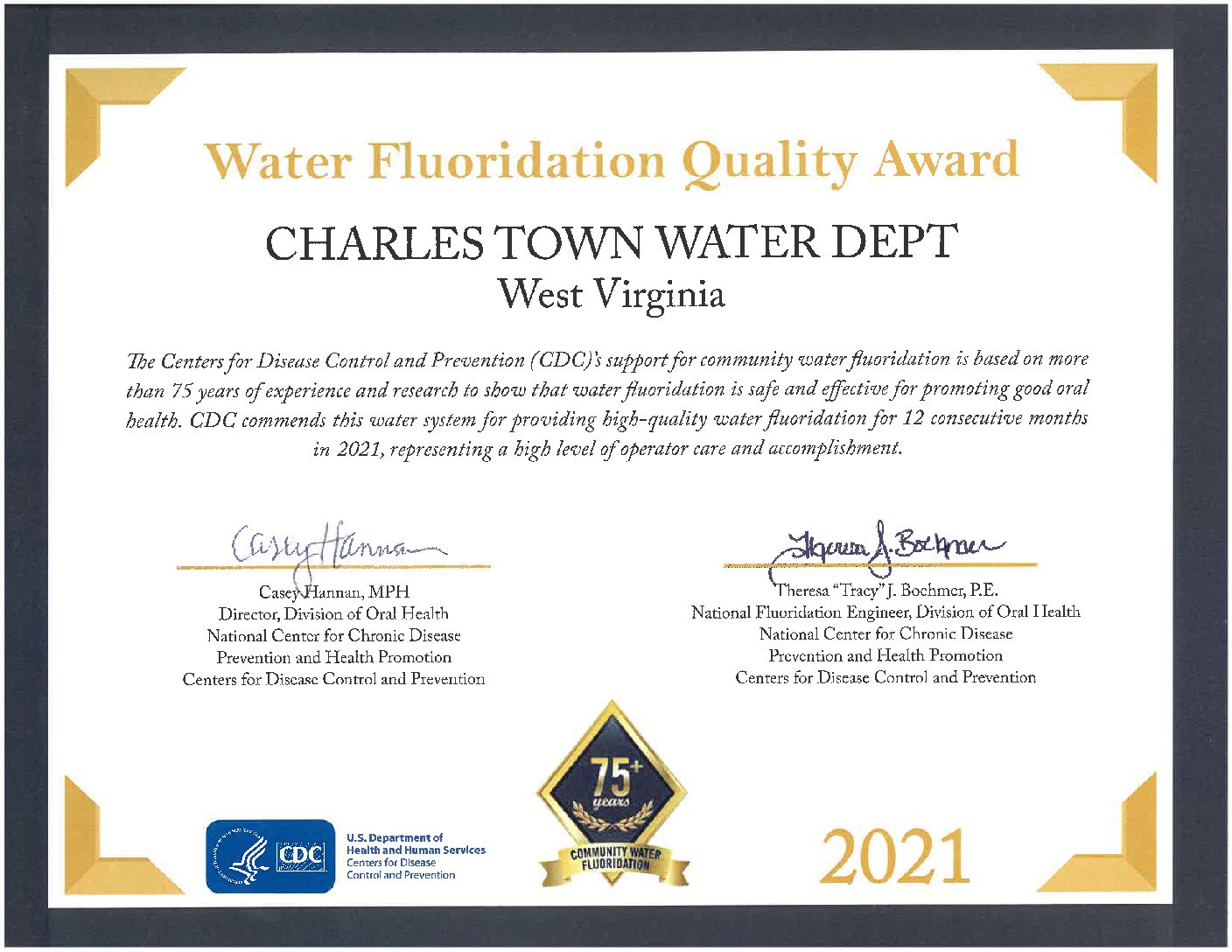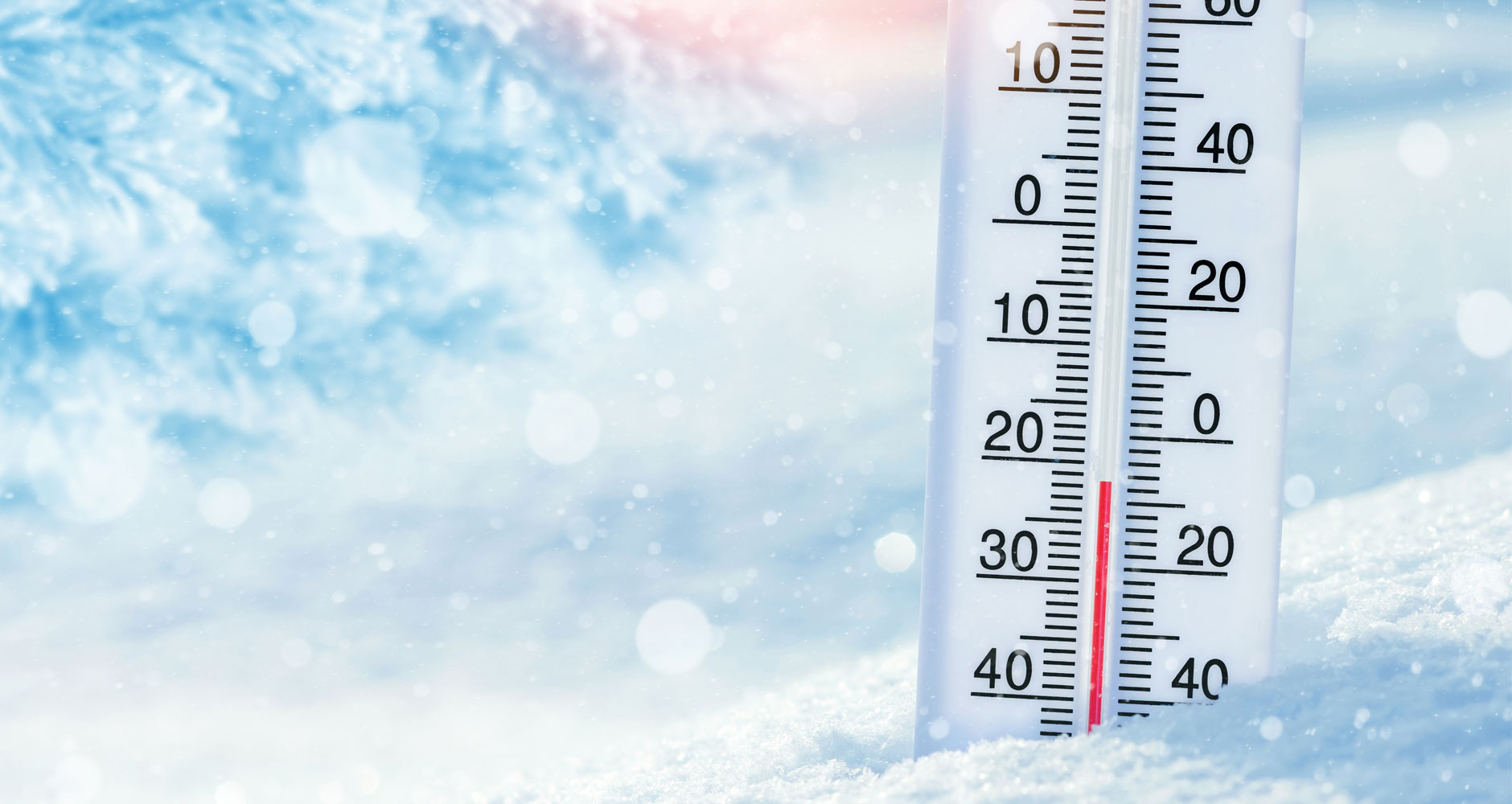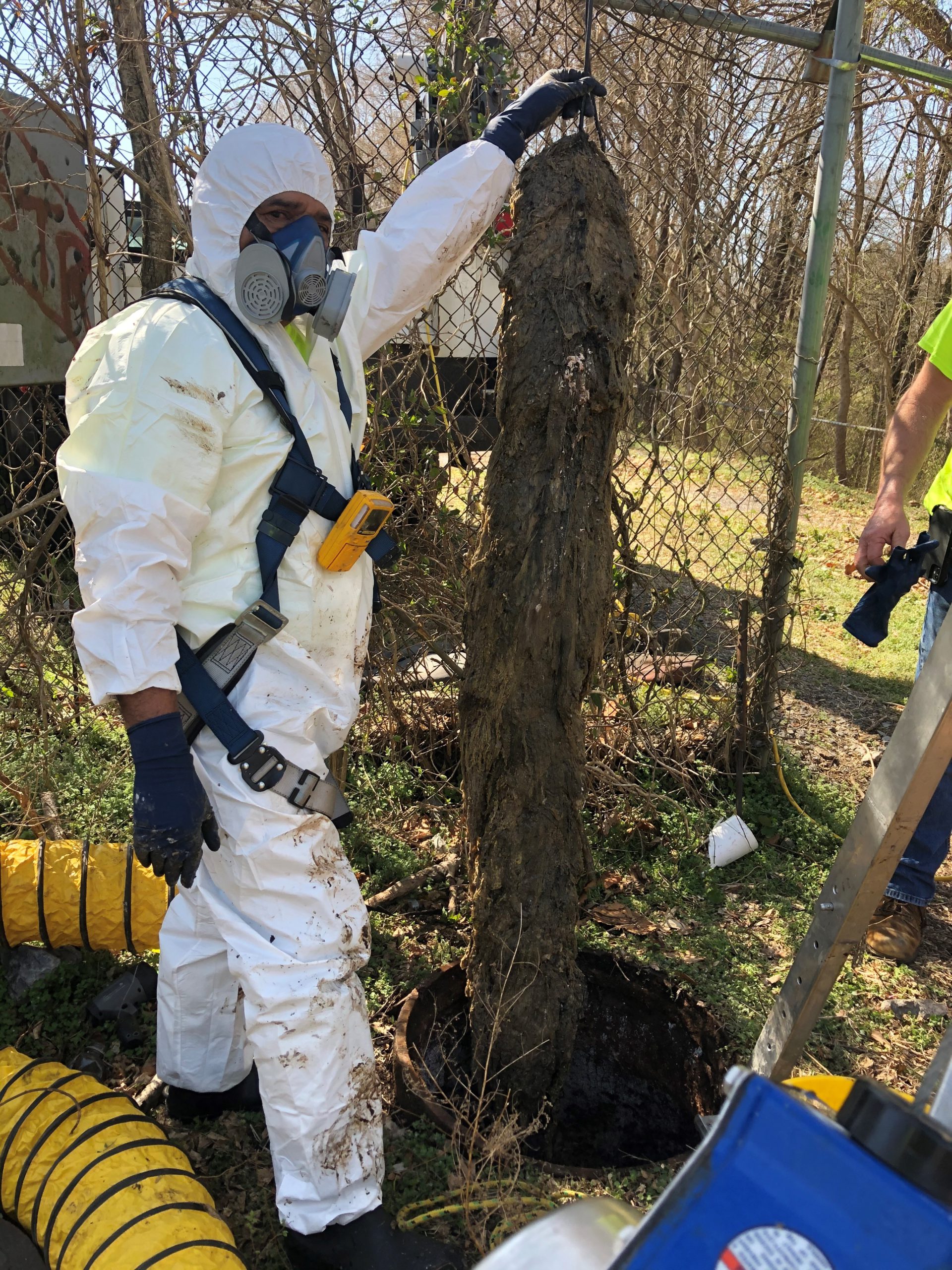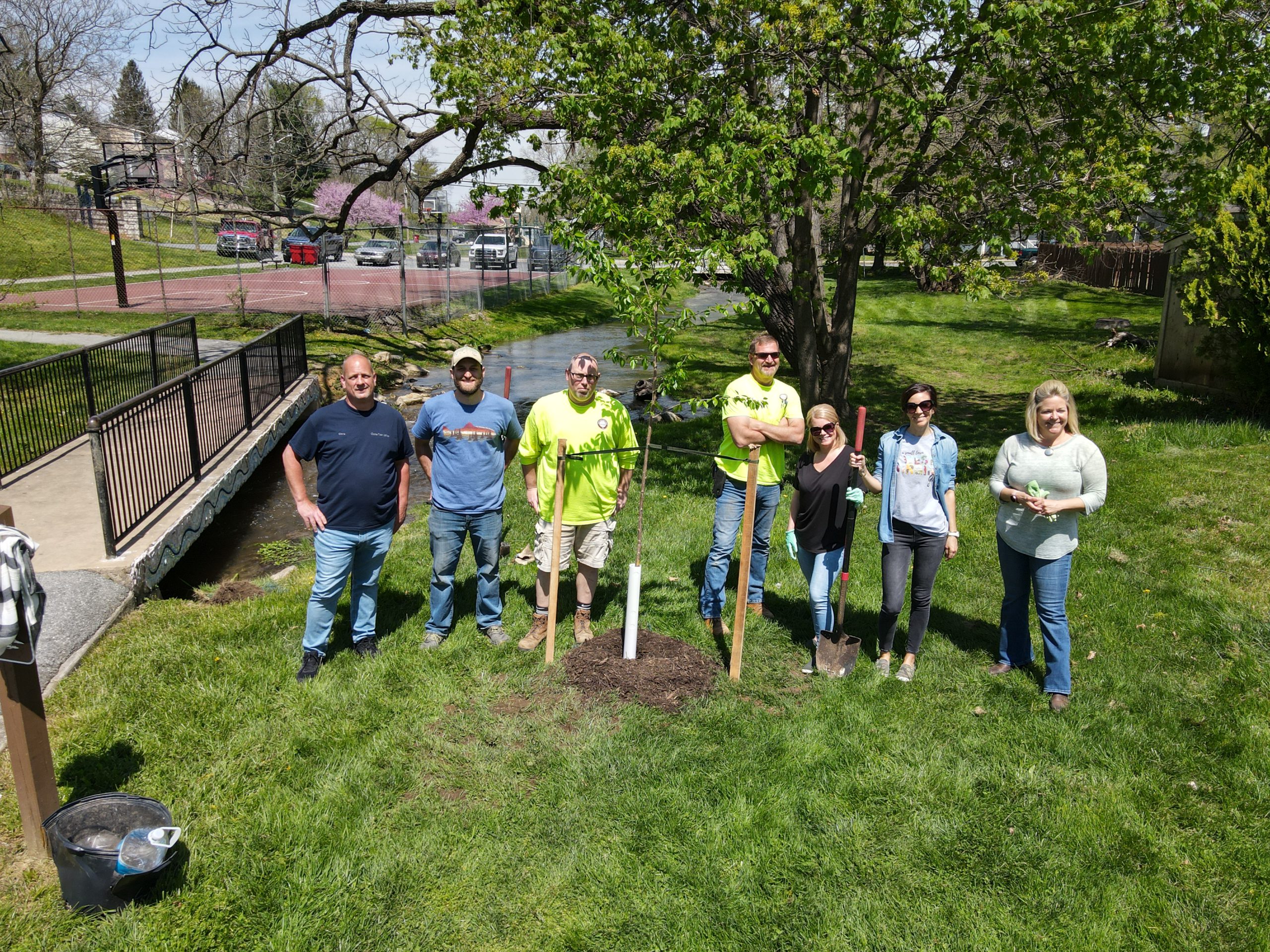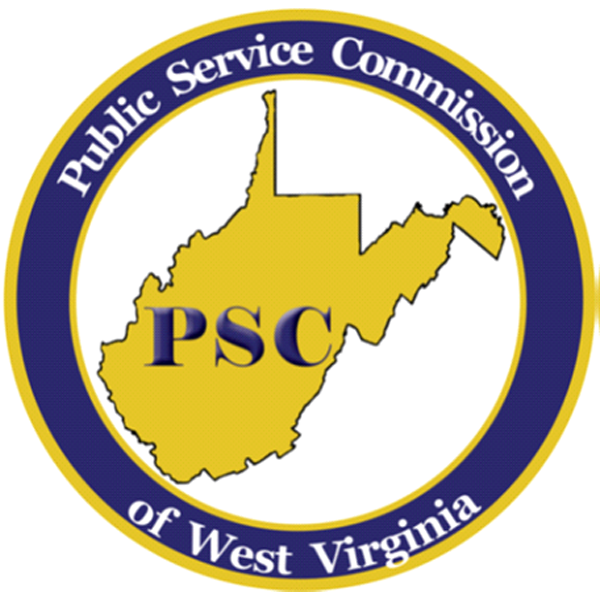The Centers for Diseases Control and Prevention awarded the Charles Town Utility Board Water Department with a Water Fluoridation Quality Award for providing high-quality water fluoridation for 12 consecutive months in 2021, representing a high level of operator care and accomplishment. We commend the dedication and determination of our staff on being awarded this achievement.
Category: Community
Posts on the Community Page
Fats, Oil and Grease
Overflows and sewer backups are commonly caused by fats, oils and grease (FOG). FOG gets into the sewer from household drains and neglected grease interceptors at businesses and restaurants. The FOG blocks sewer pipes, causing health hazards and leading to expensive fixes.
Using the garbage disposal does not alleviate FOG from entering your drain and sticking to the sides of pipes leading from the house to the street. Likewise, the dishwasher only cleans dishes, it does not remove grease. Running hot water down the sink with grease only pushes the grease further down the pipes which compounds the problem.
Please keep the following out of your drains and dishwasher:
• Butter
• Shortening
• Peanut Butter
• Meat Trimmings
• Vegetable, Canola or Olive oil or cooking oils
• Bacon or Sausage fat
• Gravy
• Mayonnaise
All of the above should be poured into a heat-resistant or other appropriate container and disposed of after cooling in the garbage, not poured down the drain.
Help protect your household and utility system pipes by keeping Fats, Rags, Oils and Grease out of the sewer system.
REMEMBER TO CALL THE CHARLES TOWN UTILITY BOARD IMMEDIATELY at (304) 725-2316 if you notice odors, roots, blockages or overflows. CTUB staff will assist and check the public sewer main and your lateral if a clean-out is available. If the problem is not in the City main, we will advise you to contact a plumber or sewer/drain cleaning service.
Cold Weather Preparation
Is your home ready for the cold? It doesn’t take long for meters and pipes to freeze during cold temperatures, especially below 32 degrees. If your pipes or meter freeze, you will not have water. With colder temps, it is important to protect your pipes as much as possible.
Here are some helpful tips:
When Temperatures Dip, let it Drip!
To keep water flowing through the pipes in your home, let one cold water faucet run at a pencil size stream. To re-use, place a jug underneath to catch the drips and use it to water indoor
plants. The amount of water used for this purpose costs significantly less than it would cost to fix the damage from a frozen pipe or replace a meter.
Insulate your Pipes
Insulate your pipes in unheated spaces like the garage and under cabinets along outside walls. Pipe insultation is relatively inexpensive and can be purchased at any home improvements or hardware store.
Set the Thermostat
Whether you’re at home or away traveling, set your thermostat no lower than 55 degrees. Travelers will often make the mistake of turning thermostats off thinking it will save on heating bills, when in reality frozen pipes and damage to personal property could result.
Don’t flush it. Trash it.
CTUB staff recently removed a giant clog of wipes and rags from a manhole in the system. Just a friendly reminder that toilets are not trash cans. Please help us protect our system and think before you flush!
Tree Planting at Evitts Run Park
The Charles Town Utility Board was chosen by the City of Charles Town Tree Board to participate in the City’s second “Social Distancing Tree Planting” event this week. The City of Charles Town Tree Board received a grant through Cacapon Institute’s CommuniTree program to plant 16 trees this Spring at Evitts Run Park. Charles Town Utility Board staff members were happy to support this great source water protection activity. #HistoricallyHIP #socialdistancetree #canyoudigit
DO NOT FLUSH…
Ways to Protect the Utility System
Be mindful of what you flush down your toilet, that could lead to costly sewer backups in your home or in the sanitary sewer system. Items can create blockages in pipes or cause damage to expensive equipment used in the wastewater treatment plant.
Please DO NOT flush the following items:
~ Baby wipes or diapers
~ Flushable wipes – they are not actually flushable
~ Aquarium gravel or kitty litter
~ Sanitary napkins
~ Rags
~ Cotton swabs, sponges
~ Toys
~ Plastic or rubber items of any kind
~ Food wrappers
~ Clothing
Wipes/Rags
“Flushable” wipes cause millions of dollars in damage to infrastructure in the United States each year. Rags and wipes mix with the fats, oils and grease (FOG) in plumbing fixtures and can create large sewer blockages. Wipes are often marketed as a good alternative to toilet paper but since they do not break down, this sometimes requires crews to unclog pipes and pumps as well as replace and upgrade equipment. Next time you debate about whether to flush an item other than toilet paper, simply put it in the trashcan or dispose of properly.
Need assistance with a delinquent utility bill?
We are continuing to work with customers facing financial hardships to establish payment arrangements. We offer contracts for deferred payment plans in most cases. Please contact our office at (304) 725-2316 to see if you qualify.
There are also local agencies that offer assistance with customer delinquent utility bills. The agencies shown below may provide direct assistance or referrals for assistance. Please contact the agency directly for more information.
- Community Ministries (304) 725-3186
- Department of Health & Human Resources (304) 724-2600
- Salvation Army (304) 267-4612
- Catholic Community Service (304) 267 8837
The Consequences of Tampering with Utility Services
By Lisa Bailey, Technical Analyst, Engineering Division, Public Service Commission of West Virginia
What can a utility do when finding a customer has tampered with utility services? What can a utility do when finding an improper connection to the water system? Can a utility terminate water service without notice? Can a utility deny service to an applicant? These are just some of the common questions the PSC often addresses through both the formal and informal complaint case process.
WV Code § 61-3-44 provides that, in part:
“Procuring gas, water, or electricity, by device, with intent to defraud; penalty, shall be punishable as a misdemeanor.”
The Public Service Commission’s Rules and Regulations for the Government of Water Utilities (Water Rules), 150 C.S.R.7, more specifically address termination of service without notice and refusal to serve an applicant.
Rule 4.8., Utility discontinuance of service, specifically, Rule 4.8.a.2., states:
“Where conditions hazardous to life or property are found to exist on the customer’s premises, or where the utility’s regulating, measuring or distribution equipment or facilities have been tampered with, the water may be shut off without notice in advance.”
Rule 4.9., Refusal to serve applicant, specifically, Rule 4.9.a., states:
“Non-compliance with rules. Any utility may decline to serve an applicant until he has complied with these rules and the Commission approved utility’s rules set forth in a Commission approved tariff governing water service.”
Rule 4.9.b., states:
“Applicant’s facilities inadequate.—The utility may refuse to serve an applicant if, in its judgment, the applicant’s installation of piping equipment is regarded as hazardous of such character that satisfactory service cannot be provided.”
Rule 4.11., Access to property, specifically, Rule 4.11.a., states:
“The utility shall at all reasonable times have access to meters, service connections and other property owned by it on customer’s premises, for the purpose of maintenance and operation. Neglect or refusal on the part of the customers to provide reasonable access to meters, service connections and other property owned by the utility for the above purposes shall be deemed to be sufficient cause for discontinuance of service.”
Rule 5.3., Customer Service Pipe, specifically, Rule 5.3.h., states:
“A customer must maintain his service pipe in good condition and free from all leaks and defects, at the customer’s cost and expense. A customer’s failure to comply with this rule may result in termination of service pursuant to these Rules.”
Rule 5.3.m., states:
“The customer shall not attach any fixtures to, or make any branches in, the
customer service pipe between the point of service and the premises served. Violation of this rule may result in termination of service pursuant to Rule 4.8.”
Rule 5.3.n., states:
“There shall be no more than one (1) customer service pipe required to serve a single premises and each premises shall be supplied through an independent customer service pipe, unless otherwise approved by the utility in writing.”
In summary, while a properly operated utility should only have to enforce these measures in extreme cases, the utility has the right and ability to terminate water service, without notice, and to deny service to customers that do not follow the proper Rules for the Government of Water Utilities.
Source: Lisa Bailey, The Pipeline, Summer 2020, Public Service Commission of West Virginia.


